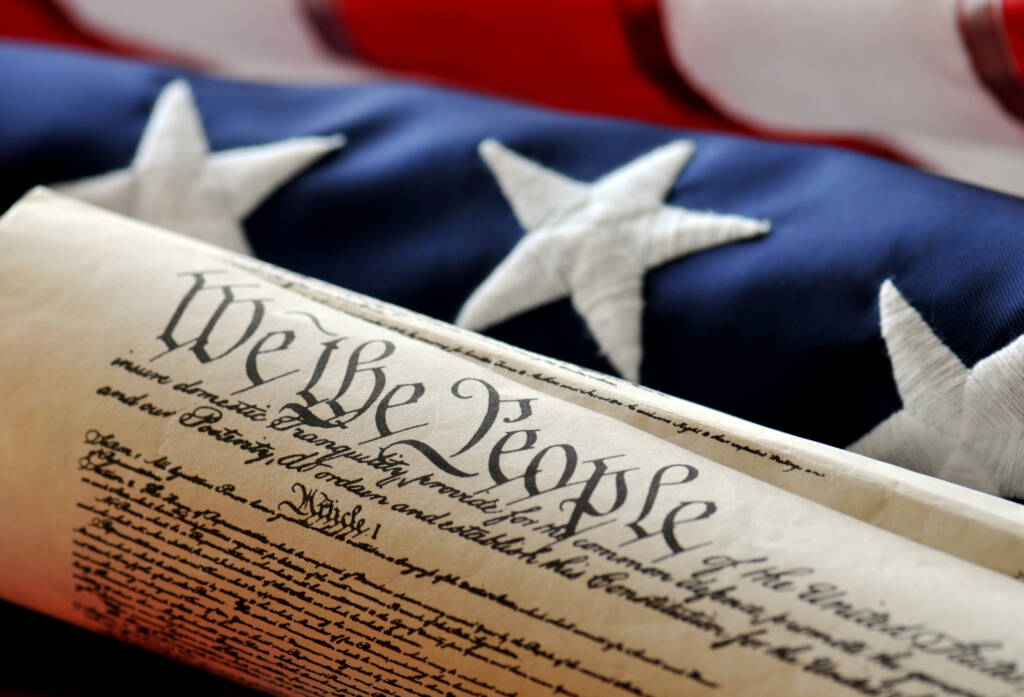
AP U.S. Government and Politics

Enrollment for the 2023-2024 school year is no longer available. Students may register now for the 2024-2025 school year and will be assigned to a course section after July 1, 2024.
Students investigate key political concepts, ideas, institutions, policies, interactions, roles, and behaviors that characterize the constitutional system and political culture of the United States. Students will study the structure of the Constitution throughout the course, as well as its implications for the functioning of government today. Other foundational documents, landmark Supreme Court cases, and opportunities for research and civic action are key elements in this rich course that prepares students to be informed and active participants in U.S. society.
Major Topics and Concepts
Segment 1
- Social Contract and the source of political power in the US
- Basic Concepts of US Government-including judicial review, checks and balances, separation of powers, popular sovereignty, limited government)
- Articles of Confederation-principles and weaknesses
- Constitutional Convention-the plans and compromises
- Ratification of the Constitution- Federalist & Anti-Federalists
- Justice Marshall and the influence of the early US Supreme Court including McCulloch v Maryland and Marbury v Madison
- Individual liberties and the Bill of Rights
- Federalism and the changing roles of the national and state governments
- Funded and un-funded Mandates from the federal government to the states
- Federal funding to the states including grants and the effect of federal money on the policies of the states
- Polling-the structure, effect and bias of questions
- Voting and sources of public opinion
- Constitutional Amendments expanding the right to vote including (XIX, XV, XXIII, XXVI)
- Voting Rights Act of 1965
- Reforms to encourage voting
- Gender Gap
- Effects of Media on voting
- Kinds of primaries in the US
- Structure and role of political parties in elections
- Description of Third parties and their role in national politics and elections
- Role of National Conventions in elections
- Primaries and caucuses-structure and role in elections
- Advantages of incumbency in elections
- Campaign finance- rules and reforms in soft money contributions
- Structure and analysis of Electoral college system
- Role of interest groups
- Federalist Paper #10 and the role of factions in elections
- Structure and analysis of political action committees (PAC) in elections
- Role of lobbyists in elections
- Bicameral Legislature
- Structure of House of Representatives
- Reapportionment
- Powers of House and Senate
- Congressional Elections
- Advantages of Incumbency
- Term limits
- Gerrymandering
- House as Representatives of the people
- Congressional Agenda
- Legislative Strategy
- Committee Structure
- Congressional Leadership
- Congressional Rules and Informal procedure
- Congressional Voting Options and Pressures
- Pluralism and Majoritarianism
- Iron Triangles
- Presidential Constitutional Powers
- Expansion of Presidential Powers
- Who elects the president?
- Executive Office of the President
- Vice Presidency
- Presidential Cabinet
- President International Role
- Presidential Character
- Bureaucracy
- Bureaucratic Departments and Independent Agencies
- Civil Servants
- Administrative Policy Making
- Regulation V Deregulation
- Federal Court System
- Supreme Court Justices
- Judicial Restraint V Judicial Activism
- Nomination Process
- Supreme Court Operations & Procedures
- Rule of Four
- Solicitor General
- Judicial Review
- First Amendment Rights
- Second Amendment
- Fourteenth Amendment
- Judicial Incorporation
- Exclusionary Rule
- Equality in the Judicial System
- Civil War Amendments
- Civil Rights Acts
- School Segregation
- Women’s Rights and Comparable Worth
- Landmark Supreme Court Cases – Marbury vs. Madison, McCulloch vs. Maryland, Dred Scott, Miranda vs. Arizona, Gideon vs. Wainwright, Gitlow vs. New York, Engle vs. Vitale, Schenck vs. U.S., New York Times vs. Nixon, Mapp vs. Ohio, Plessy vs. Ferguson, Brown vs. Board of Education, Swann vs. Charlotte-Mecklenburg, Rostker vs. Goldberg, Bakke vs. University of California
- Policy Making Procedure
- Issue Networks – Social Security
- Foreign Policy Making – Presidential and Congressional Powers and Senatorial Powers
- World view of Paradigms
- Economic Policy
- Competing Economic Theory
- Reaganomics
- Economic Troika
- Budget Process
- Gramm-Rudman-Hollings bill
- Budget Enforcement Act of 1920
- Taxation
Course Materials
AP Course & Exam Registration Requirements
College Board requires students to register for AP exams no later than November 13th (individual schools may set earlier deadlines).
All VLACS AP students are required to enroll in the “course only” section in My AP. Instructions for joining My AP will be posted on each VLACS course page and instructors are available to help with this process.
Students who plan to take the corresponding AP exam must arrange to take the exam at a local school that administers it. To register for an AP Exam, the local school will enroll the student in an “exam only” section in My AP. Students should follow these steps:
- Search for a local test site through this resource of contact AP Services for Students at 888-225-5427 [email protected]. That office can give you contact information for local AP coordinators who may be willing to test outside students. Students are then responsible for contacting coordinators on that list to see if one can arrange to test for you. You should do this no later than October 2nd. Note that schools may have their own local deadlines for receiving requests from outside students to test at their school so we recommend doing this as soon as possible
- The AP coordinator who agrees to assist you must provide a join code for an “exam only” section in My AP. You’ll use the join code to join the section so that the AP coordinator can order your exam.
Please note that, if a school allows a student to register after the 11/13 deadline, there will be a $40 late exam fee. There will also be a $40 canceled/unused exam fee if a student registers and then cancels his/her exam or if the student does not show up on test day.
More information is available on the College Board’s website: https://apstudents.collegeboard.org/
Competencies
Constitutional Democracy
Students will demonstrate an understanding of constitutional democracy by summarizing the reasons for government, describing the structure of the United States Government, describing the impact the Federalist and Anti-Federalists debate had on American politics, and explaining the constitutional principles of the separation of powers and checks and balances.
Civil Liberties and Civil Rights
Students will demonstrate an understanding of civil liberties and civil rights by comparing civil liberties and civil rights, summarizing the provision of the Bill of Rights, and evaluating civil liberties’ balance with individual liberties.
Branches of Government
Students will demonstrate an understanding of the branches of government by describing the powers and functions of the legislative, executive and judicial branches of government.
Political Culture and Participation
Students will demonstrate an understanding of political culture and participation by summarizing political socialization, explaining the ideologies of the two major parties, describing the role of the electoral college, and explaining factors that influence voters.

